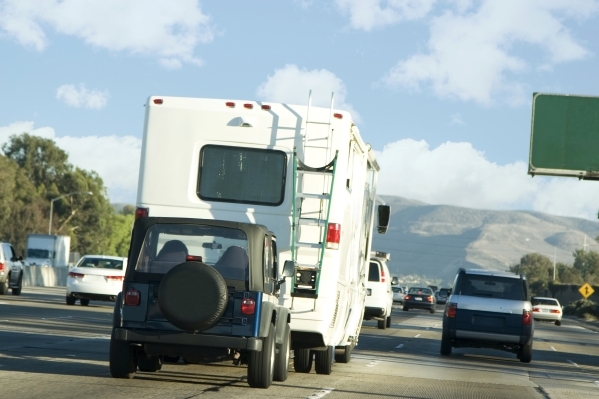Figuring out the right vehicle to tow behind an RV

It’s been more than 10 years, but I still remember it like yesterday when my young family headed out on an RV road trip down the East Coast from Virginia to Georgia. I didn’t tow a car behind the RV but wish I had because it would have made the trip that much more enjoyable.
You see them all the time. Big RVs toiling down the road with a car in tow. Doing so allows you the flexibility to get out and about when you park your rig. Cars in tow are especially important if you plan to settle down in one spot and don’t want to uproot your home to pick up a dozen eggs.
The Family Motor Coach Association has some great advice on what to consider when it comes to towing a vehicle behind an RV. They are well-suited to hauling anything from a compact to a large SUV. You just need to do a little planning.
The first thing to consider is how big of a vehicle you are going to want to tow. Be realistic. It’s not like you need a big vehicle because you will be hauling everything inside the RV any way.
Want to be really radical? Consider purchasing an electric vehicle. That might make the most sense because odds are you will never be straying far from the campground.
Pretty much any car can be towed behind an RV — you just need to figure out how you are going to tow it. There are tow bars, which can usually handle vehicles weighing 3,000 to 5,000 pounds and work with both standard and automatic transmissions. As the Family Motor Coach Association points out, the disadvantages to them are they need to be customized to each vehicle and your vehicle accumulates miles as it is being driven.
A tow dolly is another choice. They’re easy to load. You just drive the vehicle up once the dolly is hooked up to the RV. They work best with front-wheel drive vehicles because rear-wheel drive vehicles would need to be towed backwards, and that’s frowned on. Tow dollies can be expensive.
A third option is a full-blown trailer. It allows all four wheels of a vehicle to come off the ground so you’re not risking automatic transmission damage or putting miles on your odometer (and reducing your tires’ lifespan). A disadvantage would be the extra length of the trailer, and that could be a hindrance once it comes time to park for the night.
Plus, you will need to figure out where you are going to stow the trailer. There’s the added risk of your trailer suddenly being driven away, too, because they can be easy to steal.
Looking for specific recommendations for vehicles you can tow? Edmunds.com says these four are among the best choices: the Jeep Wrangler, the Nissan 370Z with manual transmission, a Chevrolet Silverado 1500 with four-wheel drive and an automatic transmission, and, as I mentioned earlier, a plug-in hybrid or electric vehicle.
Pat Maloney, sales manager at Las Vegas-based Johnnie Walker RV, said when towing a travel trailer or fifth wheel with a vehicle, Nevada law states the two-vehicle length cannot exceed 70 feet.
He added that drivable motor homes powered on diesel fuel can tow up to 10,000 pounds or more while gasoline-powered motor homes can only handle up to 5,000 pounds.
“The most common reason people buy a motor home is to tow a boat, car, all-terrain vehicle trailer or box trailer with horses,” he said. “The most important thing when towing is to make sure you have correctly installed quality equipment.”
According to Maloney, recent vehicle technology has made the towing process much easier.
“If you’re towing a boat, you need to back up and make sure the tongue is aligned over the ball,” he said. “Today, most cars have back up cameras so you can see the hitch and back up right over the ball. It’s much easier.”
As always, regardless of what you’re towing or how you’re towing, it’s a good idea to leave the installation in the hands of professionals.